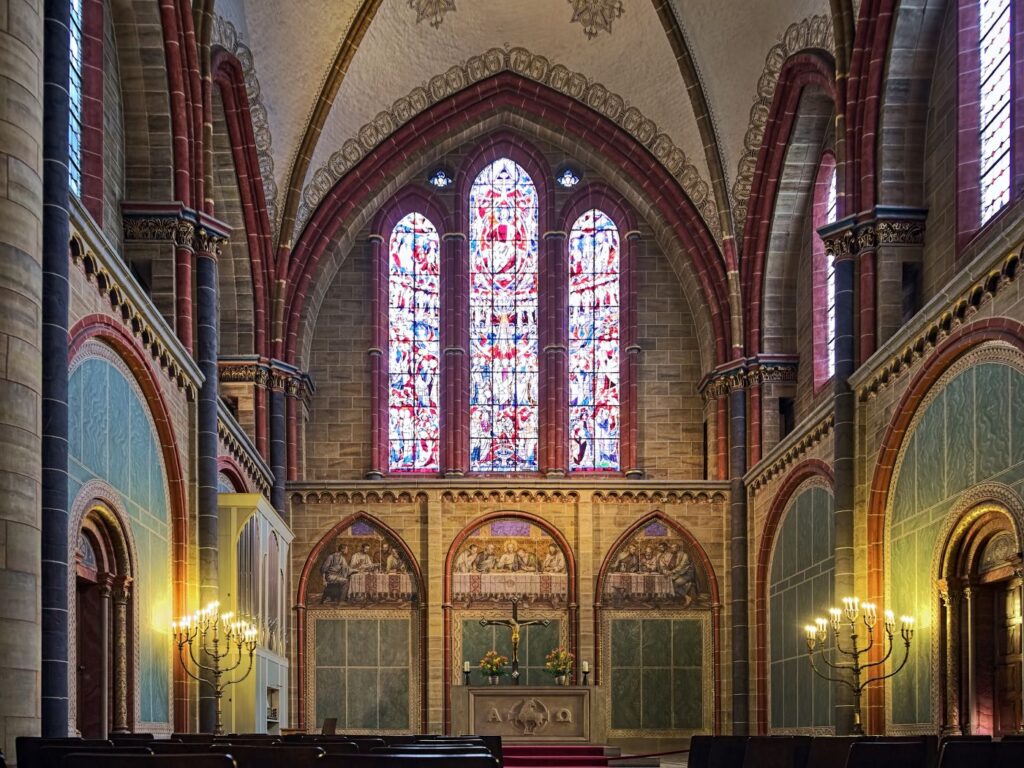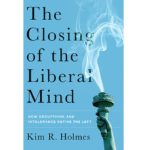Which kind of earthly politics best assists man’s path to God?
Not long ago, many theists thought the answer to this question was found in liberalism. At the Second Vatican Council, the Catholic Church reaffirmed its longstanding respect for the dignity of the person and his freedom of belief, which are at liberalism’s core. Twentieth-century Italian Catholic philosopher Augusto Del Noce, in The Problem of Atheism, called liberalism “the modern world’s greatest truth.”
He said it presumes “a generically Christian theology.” Liberalism recognizes “a reality higher than man” to which man is subject—the absolute realm of truth, or God, expressed in terms of natural law and rights. It recognizes that the individual is the beginning and end of society, not its instrument, and that he must pursue truth freely. Finally, it recognizes that the scope of politics is limited—not just because man’s final end is God, rather than the state, but because fallen human nature cannot be corrected by temporal measures: the politician can minimize sin but not eliminate it.
But today, the consensus to which Del Noce gave voice is unraveling. As historically liberal societies descend into grave moral disorders—abortion, sexual anarchy, and mutilating people (even children) through “sex-change” surgeries—religious people conclude that liberalism does more harm than good. Far from recognizing man’s sinfulness and his need for God, it seems to draw man into evil, just as Marxism and other progressive ideologies do. “National conservatives” like Yoram Hazony suggest that the collective experience of tradition, not universal human rights, is the best ground for political order. Other conservatives, including the authors of Integralism and of articles here at Public Discourse, think that other elements of liberalism, like its commitment to individual freedom, need to be toned down or scuttled.
Start your day with Public Discourse
Sign up and get our daily essays sent straight to your inbox.But if Del Noce is correct, such strategies fail because they misunderstand the nature of evil. Liberalism, rightly understood, is the natural politics of theism, because it sees evil correctly in the light of freedom.
If Del Noce is correct, such strategies fail because they misunderstand the nature of evil. Liberalism, rightly understood, is the natural politics of theism, because it sees evil correctly in the light of freedom.
The Politics of Sin
In The Problem of Atheism, Del Noce argues that liberalism and progressivism, far from being morally equivalent, are diametrically opposed.
Liberalism, in agreement with the biblical tradition, accepts what Del Noce calls “the postulate of sin”: that social disorders are inevitable because evil is ingrained in human nature by sin, man’s misuse of his free will. The will is that spiritual power by which the person partly, but really, determines his inclination toward truth—God, his heart’s greatest desire—without altering the foundations of his nature. But if man turns away from truth, even once (as we all do), he cannot completely regain it on his own—because by definition truth transcends him, and because sin, being free, really changes man, giving him a new inclination toward evil that fights his natural desire for truth. Only Truth Himself could heal such a wound by drawing man back to Himself—by means that transcend what we can do or imagine.
On the other hand, progressives, such as Enlightenment rationalists, accept “the postulate of progress,” believing that social ills are caused by poor organization alone. They optimistically think that no complexity of life is so great that better technology and more effort could not fix it, as modern science and engineering have done in many ways. But by locating evil in social structures, they deny the possibility of personal sin, and therefore undermine the possibility of man’s freedom: by holding that man could never determine himself for the worse, they imply that he could never determine himself for the better, either. And if man cannot determine himself, he is not a self, but rather an organ of the body politic.
Progressivism therefore naturally ends in totalitarianism. It tries to save man through “rational” planning, taking no regard for his freedom, and trying to remake his very thoughts and feelings by human power. And totalitarianism naturally ends in atheism, as in Marxism, because if evil can be solved merely by human reason, what need is there for God?
Liberals like James Madison can recognize why the totalitarian solution to evil is “a remedy . . . worse than the disease,” because it “heals” man by destroying him.
Religious critics of liberalism at first glance also seem to reject progressive totalitarianism. After all, they deny its optimistic anthropology and decry sin. Yoram Hazony affirms with the Bible that “the nature of man’s mind is evil from his youth.” Integralism holds that sin is the reason why earthly governments must be established at all.
But how they understand “sin” is another question.
Hazony says we sin not by choice but because moral living is “not according to our nature” at all. Divine and human legislation do not remind man’s conscience of truths he already knows; rather they are “an integral part of who he is, without which he could neither think nor speak, much less distinguish what is productive and beneficial from what is not.”
Integralism similarly locates the origin of evil more in man’s nature than in his will. Everything other than God, it says, by nature tends to fall “back into non-being” “[l]ike a drowning man,” existing in a state of ontological deficiency even before sin. God, through society—above all the Church—must continuously intervene (as though miraculously, by grace) to keep creation intact. Hence Integralism concludes: “The rights of rational creatures are not qualities intrinsic to them but derive from the extrinsic end of a society to which they belong,” the ultimate society being that of the blessed.
But this raises the question: if individual natures have no meaningful integrity of their own, how could they ever sin? Sin under this theory seems to be a structural disorder—not so much of society as Marx says, but of creation itself. Moreover, who would want to love the weak, unwise, or ungenerous Creator who made an ontologically defective creation? Indeed, why bother with the spiritual life at all? If spiritual beings, by definition, transcend society, we who radically depend on society must be mere matter.
Religious antiliberalism ends up being hard to distinguish from the progressivism it claims to oppose. Its ontological pessimism seems to be a classic “opposition by inversion” of progressive optimism: it negates the opponent’s conclusion (atheism) without rejecting the premises that gave rise to it (man’s radical dependence on society), and so cannot refute that conclusion after all.
Liberalism Rightly Understood
Sin only makes sense in the sort of religious perspective articulated by the Catholic Church in Gaudium et Spes (echoing Thomas Aquinas). God endows all creatures “with their own stability, truth, goodness, proper laws and order.” This is especially true of man, created “to the image of God,” who bears “fundamental rights.” “[A]n exceptional sign” of this “divine image” is man’s “authentic freedom,” which, in addition to giving him the power to love God, also gives him the power to love evil. A politics of theism must presume at least these truths if it is to resist atheistic materialism effectively.
Genuine liberalism, Del Noce argues, is such a political theory. The authentic freedom at liberalism’s heart is always tied to transcendent truth—the natural order in which God framed our existence, and the life of God himself in which our existence must participate. Our freedom is not determined by nature, but it is conditioned by it, and the more we serve truth, the better we will live.
The freedom for freedom’s sake of radical libertarianism is not real freedom but Marx’s “liberation” by another name: to do “just as I have a mind,” provided I do not impose my preferences on others. Nor is freedom what one finds in “the concept of pure democracy as a neutral ideal”—more or less the theory of John Rawls—which Del Noce calls “the most irrational among political concepts.” Such theories often masquerade as liberalism, claiming to promote universal rights and freedom, but they shut out the God on whom those ideals depend. These pseudo-liberalisms, not liberalism, are behind the present-day therapeutic, morally permissive cult of material well-being and “progress”—what Del Noce calls “the affluent society”—that religious people should rightly reject.
Authentic liberalism, by contrast, recognizes it “will flourish only when religiosity in a transcendent sense is alive in the culture and popular awareness” (as John Adams said of the American regime). The love of God, and the fear of eternal punishment, most effectively dispose citizens to be law-abiding and interested in the common good.
But truth can win man’s love only by the internal power “of truth itself,” as the Catholic Church reminds us in Dignitatis Humanae. To follow their “moral duty” to find God in “true religion,” men must “enjoy immunity from external coercion as well as psychological freedom.” The state’s legal power is external and coercive by nature. It can and must punish the gravest sins against the natural law—murder, theft, fraud—but it cannot change men’s hearts. Such conversion is rather fostered by religious communities through education, facilitating the individual’s encounter with the divine, and personal example. Hence the state, like other secular institutions, needs religion’s help.
If liberalism proposes any “remedy” to social evils, it is this cooperation between religion and government. By it, says Gaudium et Spes, religious and political authorities remain “in their own fields autonomous and independent from each other.” But they are not radically separated, because they are “devoted to the personal and social vocation of the same men.”
Reimagining the Breadth of Liberalism
For many, Del Noce’s vision of liberalism evokes what he calls the society “characterized by a plurality of spiritual families,” which values “the personal itinerary toward the truth.” As David Hackett Fischer and John Courtney Murray suggest, this was the de facto political order in the United States from colonial times to World War II, enshrined in the Declaration of Independence and the Constitution. It created one nation out of multiple religious communities: Puritans, Anglicans, Quakers, Presbyterians, and later Catholics and Jews. It has decayed today into widespread immorality and tribalism, but not from any internal defect. Rather, many Americans abandoned the universal bond of transcendent truth that is essential to liberalism, even if they kept falsely calling themselves “liberals.” And to reject truth itself, Del Noce argues, must always be a radical choice—a “gratuitous option,” not a consequence of any philosophical logic, liberal or otherwise.
But one need not embrace the American model to be a liberal. Del Noce thinks liberalism also finds room for those who, like Pope Leo XIII and liberalism’s religious critics, prefer a society “characterized by a unity of faith,” which “uses power in the service of the truth.” In it, as Dignitatis Humanae says, “special civil recognition is given to one religious community in the constitutional order,” as in contemporary Malta, Victorian England, or mid-twentieth-century Ireland.
Nevertheless, Del Noce and the Second Vatican Council make crucial distinctions that rule out what liberalism’s critics propose. In all societies, even pluralistic ones, religious communities of course govern their members by their own internal laws, sometimes to the point of excommunication. However, Dignitatis Humanae clarifies that if a religiously unanimous society is really committed to truth, its temporal government will not use the force of civil law to punish citizens “for joining or leaving a religious community,” whether the established one or another. Nor will it violate the “equality of citizens before the law . . . for religious reasons.” As Del Noce reiterates, “no one among the fieriest advocates of the traditional character[istic]s of truth—objectivity, eternity, necessity, immutability—ever thought of equating a truth imposed by force with a truth accepted by interior persuasion.” Enforcing religion by political means is necessarily Machiavellian: it undermines religion by subordinating it to political ends.
Unity through Charity
The distinction between religiously plural and religiously unanimous societies “must not be changed into opposition,” Del Noce urges. Whether a community confesses a single faith or not is, as others have said, “a contingent, prudential judgment—not a timeless truth of philosophy or theology.” Provided we seek truth in freedom and respect the reality of sin, we fundamentally agree.
As things fall apart around us, people of goodwill should heed Del Noce’s call for unity. The advocates of religious pluralism and the advocates of religious unanimity need each other. The latter keep the former from sliding into relativism, reminding them that freedom withers where the law does not defend justice, the family, and similar institutions. The former keep the latter from sliding into theocratic statism, reminding them, as Del Noce says, that “[i]f [truth] is not accepted freely, it is not accepted as truth either.”
Both groups even need secular quasi-liberals like Rawls, who, despite their inconsistencies, are right that religious people should use reason to meet their fellow citizens where they are. After all, if, as Gaudium et Spes says, “earthly matters and the concerns of faith derive from the same God,” reason can express—in part if not completely—the transcendent moral truths found in revelation. Of course, secularists still need religious liberals to remind them that reason alone cannot heal our fallen world—God’s grace is also necessary.
And yet, grace builds on our freedom, it does not supplant it. In order for God to heal the wounds of our bad choices, we need to respond, individually. No structural revolution in government can do that for us: your conversion and mine are up to you and me.
Let each of us then, if he wishes to restore an orderly and free society, begin by restoring his own friendship with his Creator. He alone can give us the charity that will keep our disagreements from becoming wars. He alone can give us the wisdom to craft laws and policies that respect both freedom and truth. He alone can give us peace, in part in this life, and fully in the next, in the glorious freedom of eternity.
Image by Mikhail Markovskiy and licensed via Adobe Stock. Image resized.














